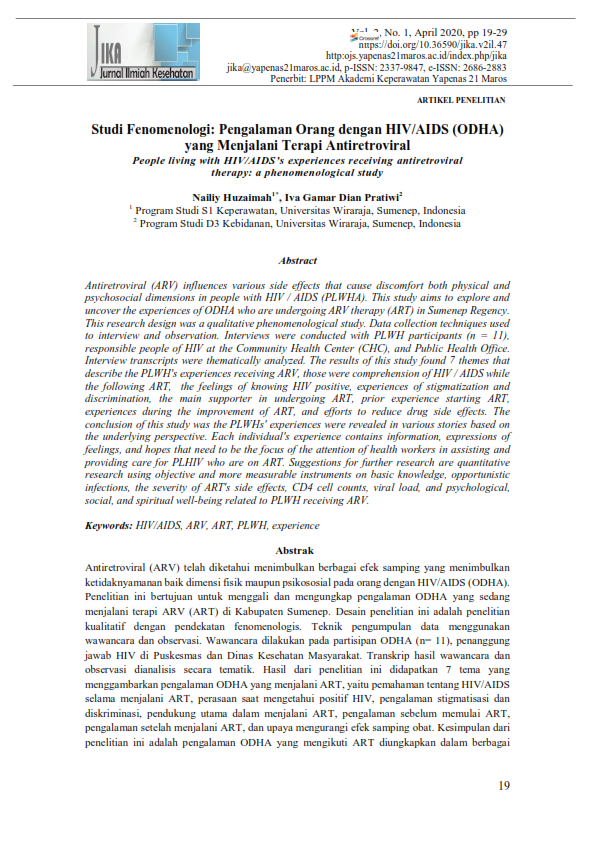People living with HIV/AIDS’s experiences receiving antiretroviral therapy: a phenomenological study
DOI:
https://doi.org/10.36590/jika.v2i1.47Keywords:
HIV/AIDS, ARV, ART, PLWH, experienceAbstract
Antiretroviral (ARV) influences various side effects that cause discomfort both physical and psychosocial dimensions in people with HIV / AIDS (PLWHA). This study aims to explore and uncover the experiences of ODHA who are undergoing ARV therapy (ART) in Sumenep Regency. This research design was a qualitative phenomenological study. Data collection techniques used to interview and observation. Interviews were conducted with PLWH participants (n = 11), responsible people of HIV at the Community Health Center (CHC), and Public Health Office. Interview transcripts were thematically analyzed. The results of this study found 7 themes that describe the PLWH's experiences receiving ARV, those were comprehension of HIV / AIDS while the following ART, the feelings of knowing HIV positive, experiences of stigmatization and discrimination, the main supporter in undergoing ART, prior experience starting ART, experiences during the improvement of ART, and efforts to reduce drug side effects. The conclusion of this study was the PLWHs' experiences were revealed in various stories based on the underlying perspective. Each individual's experience contains information, expressions of feelings, and hopes that need to be the focus of the attention of health workers in assisting and providing care for PLHIV who are on ART. Suggestions for further research are quantitative research using objective and more measurable instruments on basic knowledge, opportunistic infections, the severity of ART's side effects, CD4 cell counts, viral load, and psychological, social, and spiritual well-being related to PLWH receiving ARV.
Downloads
References
Arisudhana GAB, Sofro MAU, Sujianto U. 2018. Antiretroviral Side Effects on Adherence in People Living with HIV/AIDS. Nurse Media Journal of Nursing. 8(2): 79-85.
Ayer R, Kikuchi K, Ghimire M, Shibanuma A, Pant MR, Poudel KC, Jimba M. 2016. Clinic attendance for antiretroviral pills pick-up among HIV-positive people in Nepal: roles of perceived family support and associated factors. PloS one. 11(7).
Barroso J, Voss JG. 2013. Fatigue in HIV and AIDS: an analysis of evidence. Journal of the Association of Nurses in AIDS Care, 24(1): S5-S14.
Brown DC, BeLue R, Airhihenbuwa CO. 2010. HIV and AIDS-related stigma in the context of family support and race in South Africa. Ethnicity & health. 15(5): 441-458.
Chaka TE, Abeya SG, Adlo AM, Abebe TW, Hamuse SD, Lencha MT. 2016. Antiretroviral Therapy: Level of Adherence and Its Determinants Among Patients on Treatment in Different Health Facilities. A Cross Sectional Study in Oromia Regional State, Ethiopia. J AIDS Clin Res. 7(11): 1-7.
Côté J, Bourbonnais A, Rouleau G, Ramirez-Garcìa P, Couture M, Massé B, Tremblay, C. 2015. Psychosocial profile and lived experience of HIV-infected long-term nonprogressors: a mixed method study. Journal of the Association of Nurses in AIDS Care. 26(2):164-175.
Debby C, Sianturi SR, Susilo WH. 2019. Faktor-faktor yang berhubungan dengan kepatuhan minum obat ARV pada pasien HIV di RSCM Jakarta. 10: 16–25.
Dewi DMSK, Sari JDE, Fatah MZ, Astutik E. 2020. Stigma and Discrimination Against People Living with HIV and AIDS in Banyuwangi, East Java, Indonesia. In 4th International Symposium on Health Research (ISHR 2019). Atlantis Press. 154-159.
Dibaba B, Hussein M. 2017. Factors associated with non-adherence to antiretroviral therapy among adults living with HIV/AIDS in Arsi zone, Oromia. Journal of AIDS and Clinical Research. OMICS International. 8(1).
Doyore F, Moges B. 2016. Adherence to antiretroviral treatment services and associated factors among clients attending ART Clinics in Hosanna Town, Southern Ethiopia. J AIDS Clin Res. 7(590): 2.
Ferrer K, Rakhmanina N. 2013. Neuropsychiatric effects of tenofovir in comparison with other antiretroviral drugs. Neurobehavioral HIV Medicine. 5.
Gagnon M, Holmes D. 2016. Body–drug assemblages: theorizing the experience of side effects in the context of HIV treatment. Nursing Philosophy. 17(4): 250-261.
Gassama O, Kao CH. 2018. Factors Associated with Adherence to Antiretroviral Therapy among HIV-Infected Adults in the Gambia. J AIDS Clin Res. 9(771): 2.
Jenkin P, Koch T, Kralik D. 2006. The experience of fatigue for adults living with HIV. Journal of Clinical Nursing. 15(9): 1123-1131.
Kalichman SC, Grebler T. 2010. Stress and poverty predictors of treatment adherence among people with low-literacy living with HIV/AIDS. Psychosomatic medicine. 72(8): 810.
Kim MJ, Kim SW, Chang HH, Kim Y, Jin S, Jung H, Park JH, Kim S, Lee JM. 2015. Comparison of antiretroviral regimens: adverse effects and tolerability failure that cause regimen switching. Infection & chemotherapy. 47(4): 231-238.
Kumarasamy N, Solomon S, Chaguturu SK, Cecelia AJ, Vallabhanenim S, Flanigan TP, Mayer KH. 2005. The changing natural history of HIV disease: before and after the introduction of generic antiretroviral therapy in southern India. Clinical infectious diseases. 41(10): 1525-1528.
Low A, Gavriilidis G, Larke N, B-Lajoie MR, Drouin O, Stover J, Muhe L, Easterbrook P. 2016. Incidence of opportunistic infections and the impact of antiretroviral therapy among HIV-infected adults in low-and middle-income countries: a systematic review and meta-analysis. Clinical infectious diseases. 62(12):1595-1603.
Max B, Sherer R. 2000. Management of the adverse effects of antiretroviral therapy and medication adherence. Clinical infectious diseases. 30(2): S96-S116.
Mirza RA, Turiansky GW. 2012. Enfuvirtide and cutaneous injection-site reactions. Journal of drugs in dermatology: JDD. 11(10): e35-8.
Montessori V, Press N, Harris M, Akagi L, Montaner JS. 2004. Adverse effects of antiretroviral therapy for HIV infection. Cmaj. 170(2): 229-238.
Pence BW. 2009. The impact of mental health and traumatic life experiences on antiretroviral treatment outcomes for people living with HIV/AIDS. Journal of Antimicrobial Chemotherapy. 63(4): 636-640.
Reust CE. 2011. Common adverse effects of antiretroviral therapy for HIV disease. American family physician. 83(12): 1443-1451.
Trickey A, May MT, Vehreschild JJ, Obel N, Gill MJ, Crane HM, Boesecke C, Patterson S, Grabar S, Cazanave C, Cavassini M. 2017. Antiretroviral therapy cohort collaboration Survival of HIV-positive patients starting antiretroviral therapy between 1996 and 2013: A collaborative analysis of cohort studies. Lancet HIV. 4(8): e349-e356.









